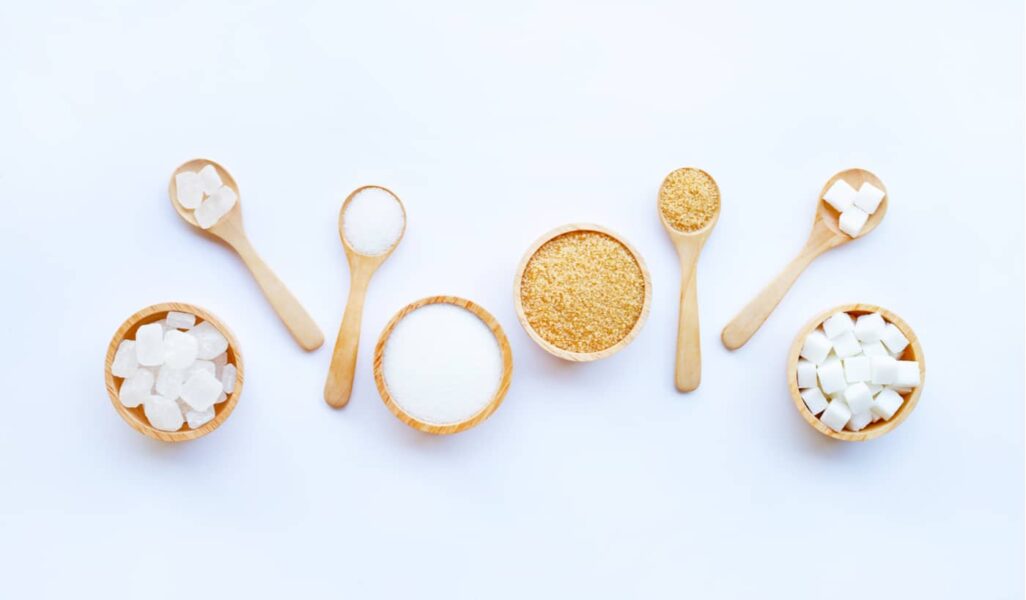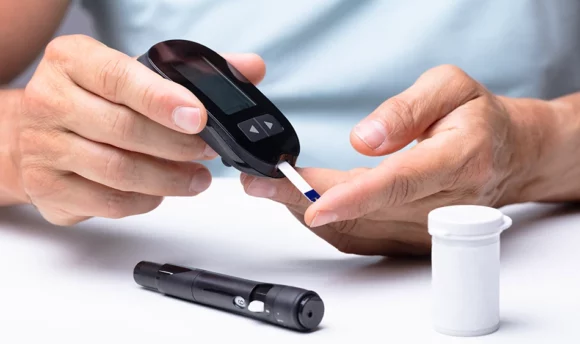What Is Sugar Alcohol, and Is It Safe on Keto?
Sugar alcohols, also known as polyols, are getting more and more popular in the keto dieters community. Are they safe to consume?

If you’re new to the keto diet, you may be wondering what some of these new terms mean when it comes to your lifestyle.
Plenty of new keto dieters have questions specifically about sugar alcohols, how they affect the keto diet and the difference between them and regular sugar.
Our experts have all the information you need to tackle your new keto diet with confidence when it comes to sugar alcohol.
What Is Sugar Alcohol?
Sugar alcohols, also known as polyols, are naturally occurring compounds that are often found in sugar substitutes. Sugar alcohols occur naturally in berries and fruits and have fewer calories than regular sugar.
The difference between sugar alcohols and table sugar occurs in their chemical makeup. Sugar alcohols aren’t sugars, and they aren’t alcohols, but they have an alcohol group attached to them called CH-OH. Sugar alcohols are converted into glucose.
5 Most Popular Sugar Alcohols
When you pick up food products labeled “sugar-free,” you’re most likely dealing with sugar alcohol. In general, there are 7 different types of sugar alcohols. However, only 5 are regularly used in food products as sugar alternatives.
Here are some of the most common sugar alcohols you’ll find in foods with sugar substitutes.
#1 Erythritol
When you eat calorie-reduced foods like baked goods and candies, you’re most likely dealing with erythritol. With a glycemic index of 0.631, erythritol only has 0.24 calories per gram, which is much less than table sugar.
#2 Xylitol
Whenever you think about sugar substitutes, you probably think of xylitol. It’s one of the most popular types of sugar alcohols often found in fruit and vegetables. Xylitol has a glycemic index of 7 and is often used in chewing gum and sugar-free candy.
#3 Sorbitol
Sorbitol has a glycemic index of 9 and isn’t as sweet as table sugar. This sugar alcohol is found naturally in fruit, and many brands and products use it to sweeten the taste of sugar-free candies and sugar-free chewing gum.
#4 Isomalt
Isomalt has a glycemic index of 2. This particular sugar alcohol is very unique in that it doesn’t lose any of its sweetness as it heats up, making it perfect for a variety of hard candies and cough drops, as well as baked goods.
#5 Maltitol
Finally, maltitol is the sugar alcohol you’ll most likely find in sugar-free ice cream and other desserts that need a creamy chocolate flavor without any added sugar. Maltitol has a glycemic index of 35 and is only just slightly less sweet than sugar.
Is Sugar Alcohol Keto-Friendly?
Yes! Sugar alcohols are, in fact, keto-friendly.
Watching your sugar is very important on a keto diet, which means that many keto food products use sugar alcohols in place of regular sugar. Sugar alcohols make it much easier for your body to remain in ketosis and don’t affect your blood sugar levels the way regular sugar does.
Are sugar alcohols carbs?
Sugar alcohols are a subsection of carbohydrates known as “polyols.” When eating food with sugar alcohols, you want to treat them just as any other carb, except for erythritol, which does not affect your blood glucose levels the same way other sugar alcohols do.
Do you subtract sugar alcohols from carbs on keto?
When counting carbs on keto, you generally subtract the fiber from the carb count. This is known as your “net carb count.” So what happens when your food contains sugar alcohol?
Sugar alcohols work differently on your net carb count. For most sugar alcohols, you can subtract half the sugar alcohol from your net carb count. When it comes to erythritol, you can subtract it in its entirety, as it does not affect your blood glucose levels.
How do sugar alcohols affect keto?
Erythritol and xylitol are the most keto-friendly of all the sugar alcohols. They don’t cause any blood sugar spikes and don’t cause any sort of upset in your stomach when consumed. However, other sugar alcohols might not be as keto-friendly.
If you’re on a strict keto diet, you want to avoid both sorbitol and maltitol, as these can cause a spike in your blood sugar levels because of the way they’re digested, rather than passing straight through your body.
The point of a ketogenic diet is to induce a metabolic state called “ketosis.” This happens when you starve your body of carbohydrates, which is its usual energy source. Most people on keto eat no more than 50 grams of carbs per day.
This means that your body needs to find a new source of energy, which is where the high-fat diet comes in. Eating high amounts of fat, moderate protein, and low carbs encourages your body to enter into ketosis. While in ketosis, your body converts stored fat into energy called ketones.
Ketosis is a particularly fragile metabolic state. When you’re in ketosis, you need to stick to your strict diet to keep your body in this fat-burning state for as long as possible. Something as small as eating too many carbs or too much protein can kick you out of ketosis.
The same can happen with too much sugar. And sometimes, it can happen if you consume too much sugar alcohol.
If you’re looking for more information on how sugar alcohols can affect your ketogenic diet, you may want to look into a keto-friendly app. We recommend Keto Cycle, which has thousands of recipes, and meal plans, including keto-friendly desserts.
Keto Cycle is a great app for beginners, as it can point you in the right direction when it comes to keto. You can track your macros, weight loss process and even connect with others in the ketogenic diet community.
Are Sugar Alcohols Safe?
Yes, sugar alcohols are safe to consume.
Sugar alcohols have a lower glycemic index than regular sugar. They don’t raise your blood glucose levels as quickly as sugar does, which is great for people who need to watch their sugar intake, such as those with diabetes.
Foods with a lower glycemic index are generally much healthier for you to consume. Sugar alcohols are also great for your oral hygiene and have been known to help with tooth decay. This is why chewing gums often use xylitol as a replacement for sugar.
However, when eaten in excess, sugar alcohols can cause bloating and diarrhea. It’s important to always eat your sweet foods in moderation, and sugar alcohols are no exception. For some people, sugar alcohol may also produce a laxative effect.
Despite being fewer calories per gram than sugar, sugar alcohols have been known to cause weight gain when eaten in excess. However, all of these side effects are only for people who eat sugar alcohol in large amounts and not in moderation.
A Word From Nutritionist
Sugar alcohols are a great keto-friendly substitute for regular sugar. Eating too much sugar can cause all kinds of adverse side effects and health risks. Sugar can raise your blood sugar levels, cause tooth decay, and even cause problems with your heart and arteries.
Artificial sweeteners can also cause problems, especially when it comes to staying keto-friendly or when trying to promote gut health. Sugar alcohols are natural sweeteners that have no adverse side effects so long as you’re not eating them in huge quantities. They’re much better for you than sugary foods.
Sugar alcohols also have fewer calories per gram than table sugar, without sacrificing the sweet taste that most people crave when it comes to sugar. If you’ve got a major sweet tooth, then don’t worry – you can still enjoy all your favorite sweet foods on keto with sugar alcohols.
Conclusion
So, are sugar alcohols keto-friendly? The answer is yes, for the most part. Some sugar alcohols tend to be better for keto than other sugar alcohols.
Erythritol and xylitol can be enjoyed on your keto diet without worrying about how they will affect ketosis.
When you’re on a low-carb diet, you don’t have to give up all of your favorite sweet and sugary foods; you just have to make sure you’re finding an acceptable sugar substitute. Artificial sweeteners aren’t always the best for keto or your health.
There are relatively few adverse effects from sugar alcohol when you eat them in moderation. This is why sugar alcohols are the go-to for people on keto looking for low-calorie sweeteners and are a perfect sugar alternative.

















































 Select your language:
Select your language: 








